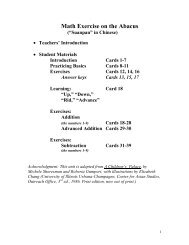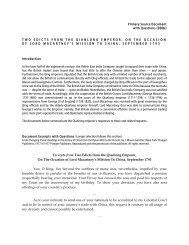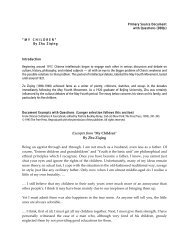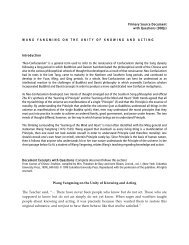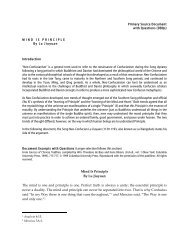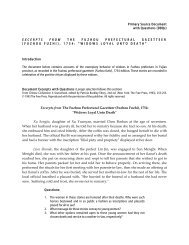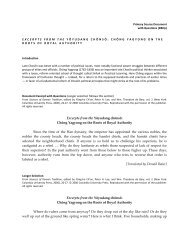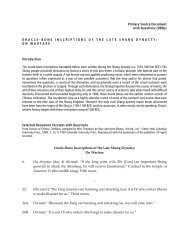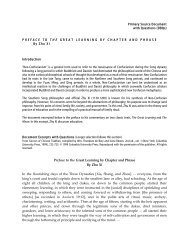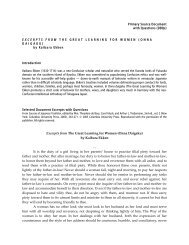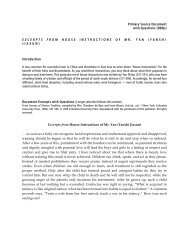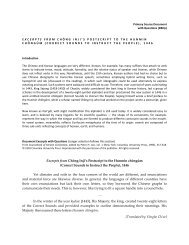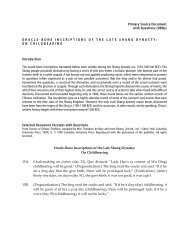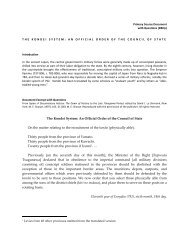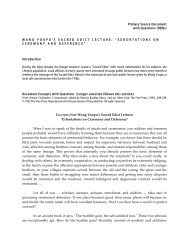The Ballad of Mulan (Ode of Mulan) - Asia for Educators - Columbia ...
The Ballad of Mulan (Ode of Mulan) - Asia for Educators - Columbia ...
The Ballad of Mulan (Ode of Mulan) - Asia for Educators - Columbia ...
You also want an ePaper? Increase the reach of your titles
YUMPU automatically turns print PDFs into web optimized ePapers that Google loves.
Primary Source Document<br />
with Questions (DBQs)<br />
THE BALLAD OF MULAN (ODE OF MULAN)<br />
Introduction<br />
This poem was composed in the fifth or sixth century CE. At the time, China was divided between north and south.<br />
<strong>The</strong> rulers <strong>of</strong> the northern dynasties were from non-Han ethnic groups, most <strong>of</strong> them from Turkic peoples such as the<br />
Toba (Tuoba, also known as Xianbei), whose Northern Wei dynasty ruled most <strong>of</strong> northern China from 386–534. This<br />
background explains why the character <strong>Mulan</strong> refers to the Son <strong>of</strong> Heaven as “Khan” — the title given to rulers<br />
among the pastoral nomadic people <strong>of</strong> the north, including the Xianbei — one <strong>of</strong> the many reasons why the images<br />
conveyed in the movie “<strong>Mulan</strong>” <strong>of</strong> a stereotypically Confucian Chinese civilization fighting against the barbaric<br />
“Huns” to the north are inaccurate.<br />
Document Excerpts with Questions (Longer selection follows this section)<br />
From <strong>The</strong> Flowering Plum and the Palace Lady: Interpretations <strong>of</strong> Chinese Poetry, by Han H. Frankel (New Haven: Yale University<br />
Press, 1976), 68-72. © 1976 Yale University Press. Reproduced with the permission <strong>of</strong> the publisher. All rights reserved.<br />
Excerpts from <strong>The</strong> <strong>Ballad</strong> <strong>of</strong> <strong>Mulan</strong> (<strong>Ode</strong> <strong>of</strong> <strong>Mulan</strong>) <br />
<br />
Tsiek tsiek and again tsiek tsiek, <br />
<strong>Mulan</strong> weaves, facing the door. <br />
You don’t hear the shuttle’s sound, <br />
You only hear Daughter’s sighs. <br />
<strong>The</strong>y ask Daughter who’s in her heart, <br />
<strong>The</strong>y ask Daughter who’s on her mind. <br />
“No one is on Daughter’s heart, <br />
No one is on Daughter’s mind. <br />
Last night I saw the draft posters, <br />
<strong>The</strong> Khan is calling many troops, <br />
<strong>The</strong> army list is in twelve scrolls, <br />
On every scroll there’s Father’s name. <br />
Father has no grown‐up son, <br />
<strong>Mulan</strong> has no elder brother. <br />
I want to buy a saddle and horse, <br />
And serve in the army in Father’s place.”
Primary Source Document with Questions (DBQs) on<br />
THE BALLAD OF MULAN (ODE OF MULAN)<br />
Questions:<br />
1. What is the proper role <strong>of</strong> the daughter as indicated in this part <strong>of</strong> the poem<br />
What philosophical tradition is the expected role drawn from<br />
2. Can <strong>Mulan</strong>’s concern and her desire to take her father’s place be justified by<br />
reference to Confucian philosophy If so, how If not, why not<br />
<br />
Longer Selection<br />
From <strong>The</strong> Flowering Plum and the Palace Lady: Interpretations <strong>of</strong> Chinese Poetry, by Han H. Frankel (New Haven: Yale University<br />
Press, 1976), 68-72. © 1976 Yale University Press. Reproduced with the permission <strong>of</strong> the publisher. All rights reserved.<br />
<strong>The</strong> <strong>Ballad</strong> <strong>of</strong> <strong>Mulan</strong> (<strong>Ode</strong> <strong>of</strong> <strong>Mulan</strong>) <br />
<br />
Tsiek tsiek and again tsiek tsiek, <br />
<strong>Mulan</strong> weaves, facing the door. <br />
You don’t hear the shuttle’s sound, <br />
You only hear Daughter’s sighs. <br />
<strong>The</strong>y ask Daughter who’s in her heart, <br />
<strong>The</strong>y ask Daughter who’s on her mind. <br />
“No one is on Daughter’s heart, <br />
No one is on Daughter’s mind. <br />
Last night I saw the draft posters, <br />
<strong>The</strong> Khan is calling many troops, <br />
<strong>The</strong> army list is in twelve scrolls, <br />
On every scroll there’s Father’s name. <br />
Father has no grown‐up son, <br />
<strong>Mulan</strong> has no elder brother. <br />
I want to buy a saddle and horse, <br />
And serve in the army in Father’s place.” <br />
<br />
In the East Market she buys a spirited horse, <br />
In the West Market she buys a saddle, <br />
In the South Market she buys a bridle, <br />
In the North Market she buys a long whip. <br />
At dawn she takes leave <strong>of</strong> Father and Mother, <br />
In the evening camps on the Yellow River’s bank. <br />
She doesn’t hear the sound <strong>of</strong> Father and Mother calling, <br />
She only hears the Yellow River’s flowing water cry tsien tsien. <br />
<br />
At dawn she takes leave <strong>of</strong> the Yellow River, <br />
In the evening she arrives at Black Mountain. <br />
<strong>Asia</strong> <strong>for</strong> <strong>Educators</strong> l <strong>Columbia</strong> University l http://afe.easia.columbia.edu Page 2 <strong>of</strong> 3
Primary Source Document with Questions (DBQs) on<br />
THE BALLAD OF MULAN (ODE OF MULAN)<br />
She doesn’t hear the sound <strong>of</strong> Father and Mother calling, <br />
She only hears Mount Yen’s nomad horses cry tsiu tsiu. <br />
She goes ten thousand miles on the business <strong>of</strong> war, <br />
She crosses passes and mountains like flying. <br />
Northern gusts carry the rattle <strong>of</strong> army pots, <br />
Chilly light shines on iron armor. <br />
Generals die in a hundred battles, <br />
Stout soldiers return after ten years. <br />
<br />
On her return she sees the Son <strong>of</strong> Heaven, <br />
<strong>The</strong> Son <strong>of</strong> Heaven sits in the Splendid Hall. <br />
He gives out promotions in twelve ranks <br />
And prizes <strong>of</strong> a hundred thousand and more. <br />
<strong>The</strong> Khan asks her what she desires. <br />
“<strong>Mulan</strong> has no use <strong>for</strong> a minister’s post. <br />
I wish to ride a swift mount <br />
To take me back to my home.” <br />
<br />
When Father and Mother hear Daughter is coming <br />
<strong>The</strong>y go outside the wall to meet her, leaning on each other. <br />
When Elder Sister hears Younger Sister is coming <br />
She fixes her rouge, facing the door. <br />
When Little Brother hears Elder Sister is coming <br />
He whets the knife, quick quick, <strong>for</strong> pig and sheep. <br />
“I open the door to my east chamber, <br />
I sit on my couch in the west room, <br />
I take <strong>of</strong>f my wartime gown <br />
And put on my old‐time clothes.” <br />
Facing the window she fixes her cloudlike hair, <br />
Hanging up a mirror she dabs on yellow flower powder <br />
She goes out the door and sees her comrades. <br />
Her comrades are all amazed and perplexed. <br />
Traveling together <strong>for</strong> twelve years <br />
<strong>The</strong>y didn’t know <strong>Mulan</strong> was a girl. <br />
“<strong>The</strong> he‐hare’s feet go hop and skip, <br />
<strong>The</strong> she‐hare’s eyes are muddled and fuddled. <br />
Two hares running side by side close to the ground, <br />
How can they tell if I am he or she” <br />
<strong>Asia</strong> <strong>for</strong> <strong>Educators</strong> l <strong>Columbia</strong> University l http://afe.easia.columbia.edu Page 3 <strong>of</strong> 3



